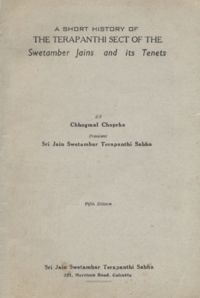धम्मो मंगलमुक्किट्ठं अहिंसा संजमो तवा
देवाति तं नमंसति जस्स धम्मो सयामनो
Religion is the highest bliss.
Non-injury, self-restraint and penance are the paths leading to it.
Even the Gods those who are religious.
- All Living Beings hanker after happiness. Real happiness however is hardly attained by any one. The standard of happiness also varies according to the conception^ of each individual. Complete happiness unrestricted by any cares and worries unlimited in its scope and duration is possible only in the liberated state. That state is known as Mukti in Jain phraseology. Its exact English synonym is hard to find. Salvation is the ordinary word, which is used to denote Mukti. How Mukti is attained and what are the stages, which must be reached in the search for the final goal, have been minutely described in the Jain Scriptures. It is not our desire here to deal with those stages or modes of attaining Salvation. In this present materialistic world to try to convince people about the necessity of striving for Mukti may sound inopportune. But when the ultimate goal is kept before the mind's eye and when it is shown how that goal may be reached by controlling our passions and regulating our mode of life, without all of a sudden giving up the amenities and advantage of all that the modern scientific inventions place within our reach, it would be easier for all to consider whether it is worthwhile to have before us the goal of Mukti and to follow the path leading to it. It may be noted in passing that Jainism does not put it down as an axiomatic truth that no other religion but Jain shows the path leading to the attainment of the highest happiness or Mukti. Jainism in this respect is most tolerant. In fact, by whatever creed one is known and whatever school of philosophy one may follow, if the universal truths on which is based the foundation of Mukti are followed by any one, he is sure to reach the ultimate goal, sooner or later. But Jainism claims that although other religions may show the paths, the final stage is reached by processes pointed out in the Jain Scriptures.
- Jainism is a religion, which is not of recent growth. We claim that it is existing from time immemorial. As the time from which 'TRUTH' can be traced cannot be fixed, we claim that Jainism also cannot be limited to any particular time.
- Jainism divides the entire world into two main divisions: Sentient beings ]Jiva\ and non-sentient things (Ajiva). It is combination of the Jiva and Ajiva that causes all the divergence in this world. When the soul is stripped of all its Ajiva bondage, it becomes pure and attains its ultimate Mukti stage.
- Jiva or Sentient beings and Ajiva or non-sentient things have no origin. They have been in existence in the past, they are present now and they will exist in future. When the combination of the two occurred is not explicable. From time immemorial they are found intermingled.
- Dharma is a word the derivation meaning whereof is that which keeps the soul from falling downward. Its exact English synonym is hard to be found. It is translated by some as "Faith" by some as "Law" and by some as "Religion". The inherent quality of every soul is to go upwards. The bonds, which keep it down and attached to this world are those of Karma (good and bad actions).
- According to the Jains sentient beings or Jivas are innumerable and so also are the non-sentient things or Ajiva. Although from time to time many a being have attained salvation and although the number of those who have been so far liberated and who will in future be liberated are also innumerable, but such is the infinitely endless number of Jivas that they never come to an end and this universe will always contain innumerable living beings.
- So long as Jiva is bound down by Ajiva, it roams about in this world. It is only when all the Karmas (which are Ajiva) are completely got rid of that the Jiva attains salvation and never comes back from that liberated stage and goes up to the highest plane, which is at the top of this universe. There the liberated soul remains forever omniscient, all blissful, who undergoes no birth or death, who suffers no affliction or worry, where there is no old age or infirmity. It is the embodiment of pure unadulterated everlasting bliss. To describe it in words is an impossible task as there is nothing in this world which can be compared with this stage. Having no desires, the liberated soul has nothing to care for. This state is the ultimate goal of every living being. According to Jain Scriptures the divine beings also have to come back to the human stage before they can attain salvation. The Jains believe in transmigration of the soul. Every soul has to take births and rebirths until it annihilates all its Karmas. Divine beings go to heaven to enjoy for their long life, the results of their good actions but at the end of divine life they revert to this world again. It is the human stage in which the practice of religion and the control of the desires are possible. Divine or heavenly beings immersed in the utmost happiness, care not for the future uplift of the soul or for the control of their unlimited desires. Having enough means to satisfy their desires they care not for the future and that is why according to Jain philosophy there is no further promotion from the heavenly state. According to the Jains, human stage is the stepping stone to complete liberation or Mukti. To utilise this stage, in the evolution of our self, should be our supreme duty.
 Chhogmal Choprha
Chhogmal Choprha
